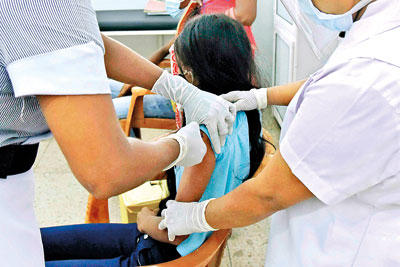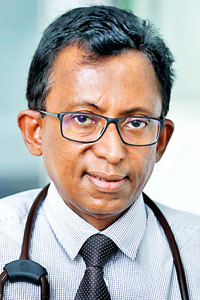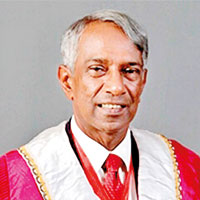News
Jabs for all children in 12-18 age group – no decision yet
Should Sri Lanka immunize all children in the 12-18 age group, is the main topic of discussion these days, with mixed views being expressed by medical professionals.
No decision has been taken yet and extensive discussions are underway on this crucial matter with the strong input of the Sri Lanka College of Paediatricians about children in the 12 to 15 age group and the Sri Lanka College of Internal Medicine about the 16 to 19 age group, the Sunday Times learns.
The two colleges are closely studying data emanating from other countries with regard to the vaccination of children, it is understood.
This was as the rollout of the first dose of the mRNA vaccine Pfizer among children with co-morbidities in the 12-19 age group began at the Lady Ridgeway Hospital (LRH) in Colombo and the Kurunegala and Anuradhapura Teaching Hospitals on Friday. The second dose is due in a month for these children. (See graphic)

Vaccination programme in progress at the LRH. Pic by Akila Jayawardana
Worldwide, vaccination took the following form:
- The United States of America, France and Hong Kong have approved two doses of Pfizer and Norway a single dose of Pfizer for all children 12 years and older
- Canada has approved two doses of Pfizer and Moderna for those 12 years and older
· The European Medicines Agency (EMA) has approved Pfizer for 12-15 year olds and the United Kingdom a single dose of Pfizer for those in the 12-15 year age group
- China has approved Sinovac for children over three years old.
Sri Lanka’s under-19 population as at 2019, according to the Department of Census and Statistics was:
- Total population – 21.8 million
- 0-19 years – 7.26m (33.3% of the population)
The mid-year population estimates by age group for 2020 by the Department of Census and Statistics were:
- 0-14 years – 5.53 million
- 15-19 years – 1.77 million
According to health sources there are 25,000 to 30,000 children with co-morbidities in the 12-19 age group. This is the group that the current vaccine rollout is targeting.
“We need to consider the risk-benefit ratio of the possibility of children getting COVID-19 and going into severe disease on one hand and being affected by rare adverse effects from the vaccine on the other hand,” said many doctors when asked about vaccinating all children in the 12-19 age group.
Looking at the number of children hit by COVID-19, one doctor pointed out that even if they catch the virus they seem to be getting off quite lightly, either showing no symptoms or being mildly symptomatic. When considering the death toll, there have been only seven deaths from COVID-19 in the 12-19 age group of which five had major co-morbidities.
On the other hand, he said, when studying vaccination data from other countries, there have been reports of rare cases of myocarditis (inflammation of the heart muscle or myocardium). These children have been treated successfully and have recovered.
“Even though these adverse effects are rare in other countries, in the context of the Sri Lankan situation, we need to tread carefully. If by chance there is a death, parents who support the National Immunization Programme 100% may start shying away from giving other vaccinations as well,” a veteran Paediatrician told the Sunday Times.
Another said that the evidence being generated on the effectiveness of the Pfizer vaccine in preventing severe disease in children in the 12-19 age group is that it can prevent 2 per million Intensive Care Unit (ICU) admissions due to COVID-19.
Is it for societal benefit?
Why are we set on vaccinating children in this age group of 12-19 years, asked Consultant Paediatrician Dr. LakKumar Fernando, pointing out that the reason of vaccination worldwide is based on a ‘societal benefit’. The thinking is that childhood vaccination will prevent a surge of COVID-19. When children come together, especially at a time when schools can be re-opened, the disease could spread among them and they could take it to their family and society, which could cause a surge of cases in the community.

Dr. LakKumar Fernando
“However, children themselves will be largely asymptomatic or mildly symptomatic. By vaccinating children even though it will not completely prevent transmission, it is likely to significantly reduce the spread of the virus. But this is not without a very small risk to the children themselves. The very small risk is where males could be affected by myocarditis after the second dose if it is the Pfizer vaccine. The incidence is slightly more in the 12-15 age group, rather than the 16-19 age group,” he said.
According to Dr. Fernando countries have recommended two weeks of significant rest after vaccination to minimize this and vigilance to admit such children to hospital if they get symptoms like chest pain following vaccination. Some countries have opted to give only one dose, but this will provide only limited short immunity of about three months. In countries like the United Kingdom which have to face winter, this is useful to cover this period but it is less relevant to Sri Lanka.
With more data emerging from countries where children are being vaccinated, it may be best not to rush, but to await more evidence to give the best to our children, he said, stressing that it is also important to explain to parents the process and get their consent when vaccination gets underway.
Dr. Fernando said that if societal benefit is being considered while awaiting a decision on vaccinating healthy children, the way forward would be to use the remaining Pfizer vaccines to give a third dose (not a booster) to the over-60 population and others with cancer and chronic kidney disease who have got two doses of Sinopharm.
“Studies from the Sri Jayewardenepura University have shown that 7% of over-60s who received Sinopharm have no protection,” he said, adding that over 12% of deaths among the over-60s are of those who have received both doses of a vaccine.

| ‘Vaccinate the children in the 12-18 age group’  Dr. B.J.C. Perera Sri Lanka should vaccinate children in the 12-18 age group, said Consultant Paediatrician Dr. B.J.C. Perera, pointing out that only “a very small number” in the 12-21 year age group had been affected by any adverse effect in other countries. Reiterating that children are also affected by COVID-19 and it is no different to adults, he said that in comparison, children may be asymptomatic (without symptoms) or mildly symptomatic but they can spread the virus to others. “The chances of a child spreading the illness (transmitting) to another child are very high and could be as much as adults or even more. They have close contact with each other and travel together,” he said, turning the focus on jam-packed school vans, buses and trains. The downside is that there may not even be an indication that COVID-19 is spreading rapidly among them. Dr. Perera strengthened his stand for vaccination by talking of the recent COVID-19 complications that children had suffered in the aftermath of an infection. Of particular concern, he said, was Multisystem Inflammatory Syndrome [MIS-C (Children)], a rare but serious condition in which different parts of the body including the heart, lungs, kidneys, brain, skin, eyes or gastrointestinal organs can get inflamed. Taking up the issue of vaccine adverse effects, he pointed out that any medication or vaccine could adversely affect a very small number and that is what had happened with the mRNA Pfizer vaccine. Myocarditis and pericarditis (inflammation of the membrane lining the heart) occurred very rarely in the 12-21 age group. “This adverse effect had been recorded more in males after a couple of weeks of the second dose. Therefore, the way forward is to closely monitor children who get the vaccine and arm the parents with knowledge so that at the first sign of difficulty in breathing or chest pain after the jab, they would bring the child to hospital,” added Dr. Perera. If your child has caught the COVID-19 infection, give him/her the vaccine after about a month has lapsed after the infection, he advises as he has got numerous calls from parents of children with co-morbidities who are now being given the vaccine. This is because there may be some interference with the full effectiveness of the vaccine by antibodies produced by the natural infection. | |

